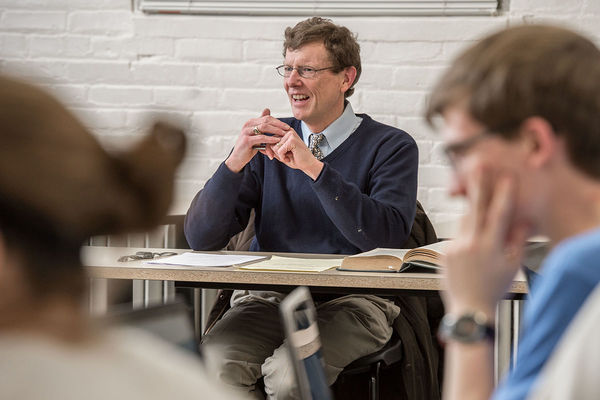

A Theory of Justice, published in 1971 by philosopher John Rawls, has been cited in U.S. Supreme Court opinions. Copies of the book were waved by students protesting China’s authoritarian rule in Tiananmen Square in 1989. A political party in England once named the work as its platform.
It has had a lasting and far-reaching influence on the fields of economics, political science, philosophy, and law — and nearly 50 years after its publication, it remains one of the greatest works of political philosophy ever produced, said Paul Weithman, the Glynn Family Honors Professor of Philosophy.
With funding from a Collaborative Research Grant from the National Endowment for the Humanities, Weithman is planning a conference commemorating the 50th anniversary of the book’s publication in September 2021.
“The number of scholars who have been and continue to be interested in the book and its implications is an impressive testament to its quality,” Weithman said. “It is well worth commemorating for its significance not just at the time it was published, but also for its continued importance.”
Notre Dame College of Arts & Letters faculty have a long track record of success with the NEH — receiving several Collaborative Research Grants, Digital Humanities Implementation Grants, and Public Scholar Grants in recent years, and winning more NEH fellowships than any university in the country since 1999.
The conference will bring together 30 of the best political philosophers from institutions around the world — including the Johann Wolfgang Goethe University in Frankfurt, Germany; the London School of Economics; Harvard University; and Yale University, among others — as well as early and mid-career faculty members.
“Rawls is someone to whom I owe a lot, and I’m happy to be able to pay tribute to him on the 50th anniversary of the publication and what would be his 100th birthday. And I’m really glad to be able to bring these scholars to Notre Dame because I think what we have here is terrific — and I want people to see that.”
The goal of the event is not primarily to celebrate the work, Weithman said, but to engage with it and advance scholarly understanding of Rawls’ thought.
“The book was written over the course of 15 or more years, during a period of high and equitable economic growth, of relatively low economic inequality, and at a time when many Americans had faith that government was an instrument of social improvement,” Weithman said. “Much has changed in the decades since, and those changes have raised new problems for political philosophy to consider.”
Presenters at the conference will explore Rawls’ relationship to other political philosophers in the modern period, including Hobbes, Rousseau, and Marx; his failure to address racial injustice; and how Rawlsian liberalism differs from neo-liberalism, among other topics.
Weithman is excited about both the caliber and range of participants — and hopes the conference will inspire the next generation of scholars as well.
“Having the conference at Notre Dame allows undergraduate and graduate students — from a variety of disciplines — to participate in both formal sessions and informal gatherings,” he said. “And you never know what that will spark. Some students might walk away with a thesis topic or just an idea they want to explore or a book they want to go read. All that would be to the good of the field.”
The event, scheduled to be held in the newly renovated Notre Dame Conference Center from September 24–26, 2021, offers the opportunity to showcase the caliber of Notre Dame’s faculty, students, and facilities, Weithman said.
And for Weithman, who wrote his dissertation under Rawls while completing a Ph.D. at Harvard University, it is a chance to pay homage to a valued mentor.
“Rawls is someone to whom I owe a lot, and I’m happy to be able to pay tribute to him on the 50th anniversary of the publication and what would be his 100th birthday,” he said. “And I’m really glad to be able to bring these scholars to Notre Dame because I think what we have here is terrific — and I want people to see that.”
Originally published by at al.nd.edu on September 23, 2020.